FC Dallas’ Luchi Gonzalez is supercharging opportunities for talented young players
Luchi Gonzalez is a modern player’s coach — Technical, smart, driven and willing to give chances to young players, he walked this player development path himself as a youth. Drafted by the San Jose Earthquakes sixth overall in the 2002 MLS SuperDraft, Gonzalez is a young Head Coach who has more experience developing players than many twice his age.
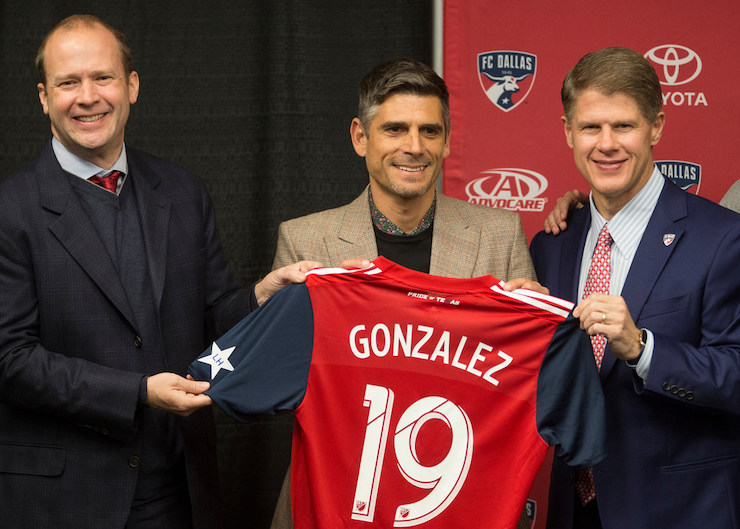
FC Dallas has a tradition of developing homegrown talent and now with Luchi Gonzalez as the Head Coach, this emphasis on building today for tomorrow is assured. Gonzalez was the club’s MLS Development Academy Director for three years before becoming the head coach. In fact, Gonzalez initially joined FC Dallas as the U18 coach and later coached the U16s and U17s and has a long history of commitment to player development.
Incorporating youth talent into the first-team environment and providing valuable professional minutes in games to young professionals is part of the FC Dallas culture.
FC Dallas has signed 17 Homegrown players coached by Gonzalez since he joined the organization: Kellyn Acosta, Danny Garcia, Jesse Gonzalez, Coy Craft, Alejandro Zendejas, Aaron Guillen, Paxton Pomykal, Jesus Ferreira, Bryan Reynolds, Reggie Cannon, Brandon Servania, Kris Reaves, Jordan Cano, Chris Richards, Thomas Roberts, Edwin Cerrillo and Dante Sealy.
Gonzalez is the 7th coach in FC Dallas’ club history and is the youngest current head coach in MLS.
Gonzalez was recently complimented for his vision, focus on developing young players and leadership building an identity in an interview with Sean Tsakiris – Read: SHAUN TSAKIRIS ON LEADERSHIP, DOING IT RIGHT AND ARE WE THERE YET?
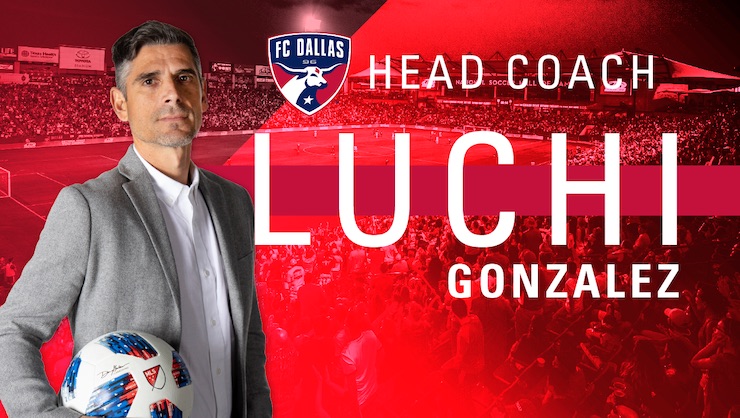
Interview with FC Dallas Head Coach Luchi Gonzalez
Diane Scavuzzo: You have a wonderful reputation — can you explain your focus on developing young players and letting them earn key minutes on the field?
Luchi Gonzalez: It’s been organic to be honest. It’s a collective effort of many people in the club. Fernando Clavijo, FC Dallas’ former Technical Director, who passed away earlier this year, his belief in young players was a big influence. Our owners, Dan and Clark Hunt believe in homegrown players and homegrown talent.
The vision has always been focused on development from within with the goal to one day have a first team that was comprised mostly of Academy players, or at least the most in the league — and so we’re focused on that everyday.
Even though I’m a first team coach and I have humble beginnings, when I stopped playing and started coaching, I myself went through development as a coach, as a teacher, as a manager, and now I have the opportunity and the responsibility at the first team level. Our way is to continue to do what we do — which is focus on finding and creating value from within.
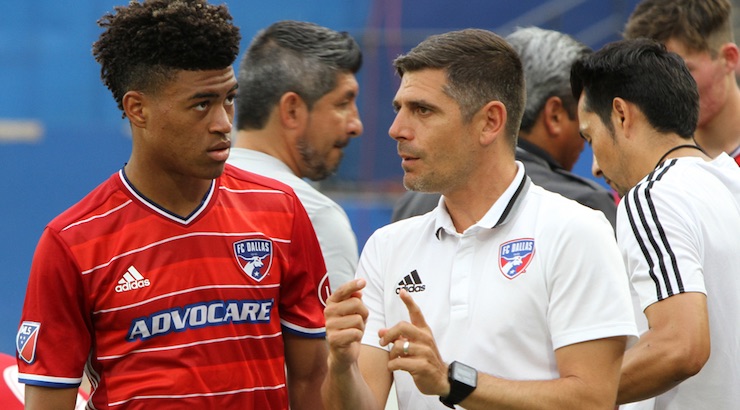
It’s not always going to be perfect or work out and the majority of our players in the Academy don’t sign pro contracts — but through this process, we’ve got lifelong members of our family because of the environments they go through.
I still have a lot of great relationships with players who never played for this club
Diane Scavuzzo: What is your coaching philosophy, and can you describe your style of play?
Luchi Gonzalez: I would say every club has their philosophy, their style of play.
Ours is one that’s based around ball possession and attacking and creating and pressing and transitioning and pressing to get the ball back.
There’s a lot of different ways to do that but that’s just a few words to describe the way we want to play.
With this comes the need for good coaches. You need to educate your coaches — they need to be good human beings, good teachers. We have an amazing facility here in Dallas, almost twenty fields, so we’re really privileged to have this facility to create and develop young players.
Dallas is a city with a competitive spirit, and we’ve got a very diverse melting pot of nationalities, backgrounds and cultures in Dallas that, fortunately for us, like soccer.
45% of the population in the metroplex is Latin-American so that’s something that adds to the talent, to the environment, the way we try to play.
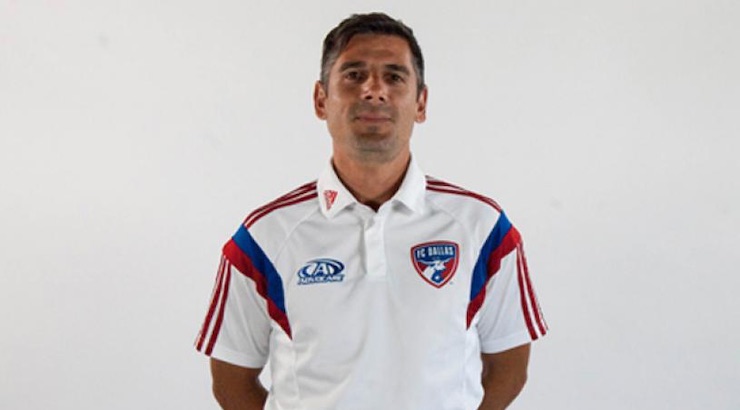
I think competition is important, especially in international games. We always find ways for our Academy players to play international events. We feel that every Academy player coming through, by the time they are a U19, they should have played at least fifty plus international club games.
Diane Scavuzzo: Wow, that’s a huge number of international games!
Luchi Gonzalez: We want our U10 and U11 players already in international events. So if you do the math, you’re averaging about 8 or so international club games a year.
If a player joins the Academy late in the process, they do not get to play fifty, but they get to play at least twenty or thirty international matches. It’s not ideal, but our goal is to make sure every player at U19, has played at least fifty international games. We feel that’s like that perfect number for a player to get the experience, and to be tested in and out of their comfort zone so they’re prepared for the higher level of the game.
Tactically, technically, mentally, that’s important.
Diane Scavuzzo: As an MLS Head Coach, are you ever worried about playing younger players? When I’ve talked to other coaches, there’s a reticence, a hesitation — it’s so important to win these professional games. Some coaches do not give young players the opportunity to get valuable playing time ….
Luchi Gonzalez: Yes, but winning for us comes hand in hand with playing young players, and believing in them.
In the club, we just have a conviction that we can win with young players. That’s the way we’re going to live — because we know that’ll create value.
Young players, they don’t have experience, they’re not as proven, but they’re fearless, they have courage, they’re open to try things.
Young players are going to work really hard. Obviously, we don’t want the roster to be so lopsided that you have a first team that’s maybe too young, so there’s definitely a balance, but we’re willing to tip the scale a little bit on the younger side — to be heavier on that side.
Diane Scavuzzo: This is a concept throughout FC Dallas?
Luchi Gonzalez: Yes. We show it with all of our younger Academy teams. We have a U14 team that plays with multiple ‘O6 players when it’s a mostly an ‘O5 team. We’ve got a U17 team with a bunch of O3’s starting. We also have a U19 team with O2’s and O3’s as well playing.
We’ve got a second team professionally that’s has two O3’s starting.
I’m not afraid to put young players on the field because I believe they can win. I believe we can win with them. Now, we need to keep finding the balance.
It’s a conviction that our owners share and that’s the experience I’ve had in the Academy when I was a director and a coach.
At the first team level, I know the pressure’s different but I am going to stick to why I got the opportunity in the first place.
That’s what I plan to do and, of course, I’m going to adapt, I’m not naïve about it, but that’s the process we’re in right now.
Diane Scavuzzo: Where do you see college fitting in for your DA players? Your U-17’s and U-19’s?
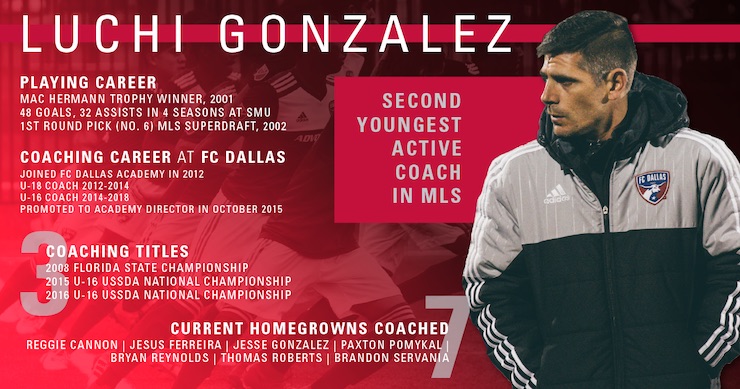
Luchi Gonzalez: We 100% want to support all of our players so they can continue their education and get college credits and graduate one day.
The ones that end up going in a pure college pathway, an on-site campus education, that’s great and we’re going to track those players — they’re going to come back in the summer and play.
We’ve got players that play a year of college or two or even four years at college — and we bring them back in and we sign them.
We see something in them that maybe wasn’t clear before they played in college. Maybe a player needs to play four years in college, or just one semester, but it’s all circumstantial — it’s all based on our profiles and the progress of each player.
The beauty of that is our door is open for these players.
We continue to monitor them. Never say never with these guys. You don’t want to let someone off too early. I think that would be a mistake.
Diane Scavuzzo: What would you want to say to a coach who’s hesitant about playing young players?
Luchi Gonzalez: What you’re doing is you’re allowing a player to be challenged in a way that’s going to help them adapt and reach their long term potential. But a lot of times in the youth game, we want short term gains because we want to win that cup, we want to win that trophy.
At FC Dallas, we’re proud to compete in all of our events, the GA Cup, Dallas Cup, USSDA. Those are really important events for us, but …
Events are not more important than an individual getting to our first team.
That’s our number one priority.
There’s no feeling better than having coached a player who has made it to the highest level. To me that’s what development is all about.
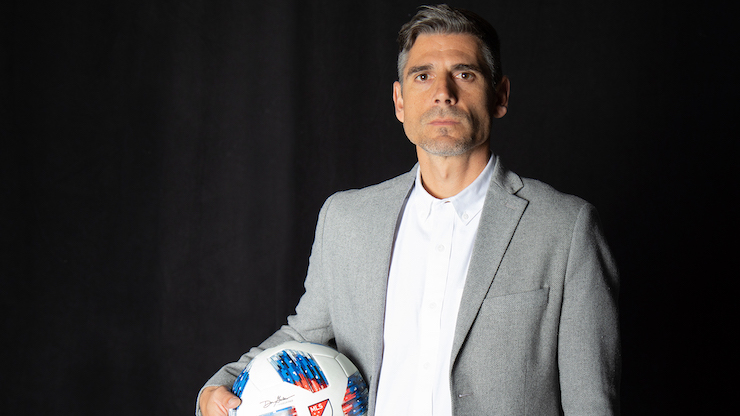
Diane Scavuzzo: What advice can you share?
Luchi Gonzalez: It all depends on the club’s philosophy. My advice is if the player has the technique and a brain for the game, then that player can be trusted on the field to be effective.
Even though maybe they’re not as fast, they’re not as strong physically.
If they play the game with good technique, making good decision with good timing, and good positioning, that’s a player that can play like an Iniesta — players who were overlooked when they were younger because of lack of physical tools.
Just be careful that you don’t overlook a young talent, or you don’t think that a player can’t play just because of their physical tools.
I warn coaches not to ignore a young talent that certainly can play up. Even a young player who is not the most athletic player, or the fastest player, or the strongest player — but if he’s got technique and a brain — when he physically develops, that player can be very successful, as long as they have a coach that can guide them through that process.
Diane Scavuzzo: How do you know Shaun Tsakiris?
Luchi Gonzalez: Shaun and I go way back. We were teammates on the U20 qualifiers, with the U20 U.S. team.
We shared some interesting teammates: Tim Howard, Taylor Twellman, Carlos Bocanegra, Steve Cherundolo. It was a great group of guys that went on and had great careers. I had an 8-year pro career — very modest, very average, actually below average pro career.
It was a great moment that I shared with Shaun and I’m glad to maintain our relationship now as coaches, colleagues and teachers. Shaun did a great job in the U.S. National Team. I know he’s working in youth soccer again and whatever club has him, they’re lucky to have him and I wish him the best.
Head coach @LGonzalezFCD is
— FC Dallas (@FCDallas) May 9, 2019
supercharging opportunities for talented young players: https://t.co/S6F4gR37DK
(via @SoccerToday_USA) pic.twitter.com/MXlqhx48he
Correction 5.8.19: Luchi Gonzalez became the youngest MLS coach after Anthony Hudson from Colorado Rapids was let go last week. Gonzalez was originally listed as the second youngest MLS coach.





